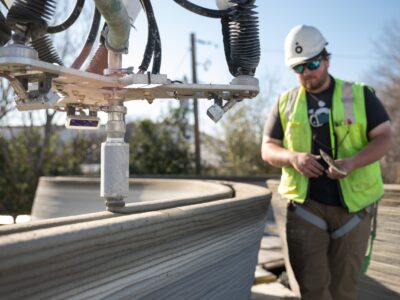When Earth Day was first observed on April 22, 1970, 20 million Americans were a part of the celebration — 10% of the entire U.S. population. Today, it has evolved into a global event celebrated by more than 1 billion people and 190 countries working toward a healthier, safer planet for all of us. To celebrate this year’s Earth Day, here are 23 activities you can try:
- Plant native flowers and plants. Not only do native plants help you conserve resources by being low maintenance, but they are great for bees and pollinators in your area.
- Opt to walk or bike instead of drive. The National Household Transportation Survey reported that 13% of all car trips were one mile or less. For short errands, it’s better to eliminate carbon emissions by walking or biking.
- Make reusable container swipes instead of plastic. Get rid of single-use plastics in your daily life. Consider beeswax wraps and reusable silicone containers. If your food comes in glass containers, recycle them!

- Sort your recycling. Sorting helps ensure the right material is put into the proper process. Sometimes if items aren’t sorted or are incorrectly separated, they end up in landfills.
- Support local businesses. Local businesses not only help ensure a unique makeup of shops in the community, but everything they do is on a smaller scale, lowering their carbon footprints.
- Try to meal prep every week. The Environmental Protection Agency reported that one-third of all food in the U.S. goes uneaten, making up a large portion of global emissions in landfills. Meal prepping helps limit food waste, ensuring you cook and eat what you buy or already around your house.

- Learn how to make your hobbies more sustainable. Many activities, especially art-centered ones, produce a lot of waste. Consider ways to reuse materials or upcycle them. Even think about picking up a skill like sewing or pottery that allows you to be more sustainable in everyday life.
- Visit your local farmer’s market. Get a group of friends together and support local farmers who provide seasonal and fresh produce to your community.
- Go on a hike. Not only is Earth Day about advocating for climate action and focusing on how to make your life more eco-friendly, but it’s also about appreciating the nature around you.

- Bring reusable bags to the grocery store. One tip to make sure you don’t forget reusable bags is to always leave a few in your car.
- Think about changing your diet. Animal products generally have a larger carbon footprint on the planet. Eating them in moderation or cutting them out can lower this number. The Earth Day organization even provides a “foodprint” calculator to help us understand how our diets impact the environment.
- Look into permanent house swaps that are eco-friendly. Some investments include solar panels and insulating your home. Smaller scale ones involve using energy-saving light bulbs or starting a garden. Check out vertical garden ideas if you have limited outdoor space.
- Start a compost bin. Keeping food out of landfills lowers global emissions, and the compost can be reused in gardens to improve soil quality and eliminate the need for pesticides and chemicals.
- Upcycle a piece of clothing you don’t wear often. Fast fashion is a huge problem, ending up as waste and leaving behind chemicals. Instead of buying something new, consider ways to upgrade what you already have.
- Contact people in power. Email your senator, congressman, boss, or teacher to see how your institutions can be more conscious of the environment.

- Join or organize a community litter clean-up event. Joining a group to care for your town is a great way to foster solidarity and build environmental awareness.
- Find ways to conserve water in your household. Whether taking short showers or running the dishwasher instead of hand washing, water is a precious resource and must be preserved.
- Support National and State Parks. Buying a pass ensures that rangers and conservationists can continue to keep our parks beautiful and healthy.
- Donate to environmental nonprofits. If you have the means, monetary donations help extend the fight for climate action past April 22.
- Start a community garden. Don’t have room at your house for a garden? Community spaces provide the perfect solution while giving you a larger pool of resources and knowledge to provide food for the community.

- Get kids involved and go on a nature walk. Educating children on the beauty of nature is essential to fostering care for the environment as they grow up.
- Visit a bulk/refill store in your area. Refill stores are a great way to limit waste by buying the exact quantities of what you need and cutting down on single-use plastics.
- Make a post on social media. Check out the Earth Day organization’s social media toolkit and make a post using #InvestInOurPlanet to spread awareness.





